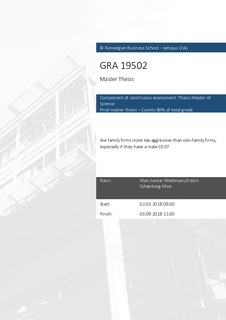Are family firms more tax aggressive than non-family firms, especially if they have a male CEO?
Master thesis

View/
Date
2018Metadata
Show full item recordCollections
- Master of Science [1621]
Abstract
Taxes has received much attention the past years, with scandals like Enron and the
Panama- and Paradise papers setting it on the agenda in many countries. Although
there exists extensive research on individual tax avoidance, research on corporate
tax avoidance- and aggressiveness is more recent. Further, research of family
firms, especially private, is underrepresented in current literature compared to the
share such firms constitute in the world. The complexity of firm behaviour
complicates the discussion and theory is not unambiguous in its expectations of
firms’ tax behaviour. The dominating theories on differences in tax aggressiveness
between family- and non-family firms are agency theory and the socioemotional
wealth perspective. While many of the previous studies on family firms and tax
aggressiveness base the main analysis on one of the two theories, we seek to
combine them in order to enhance the understanding of firms’ tax aggressiveness
and differences between family- and non-family firms. Using data of Norwegian
public- and private firms, we compare family- and non-family firms, as well as the
effect of listing status within the group of family firms. In our main analysis, we
do not find a systematic difference between either private- nor public family- and
non-family firms but discover that public family firms may be less tax aggressive
than their counterparts when investigating larger firms, substantiating the findings
of Chen et al. (2010). Moreover, we find that family dominated private firms are
indeed less tax aggressive but are not able to identify a clear non-linear
relationship between family ownership and tax aggressiveness. Further, we
analyse whether family firms’ tax behaviour differ when the CEO is male
compared to female. The results indicate that both private- and public family firms
are more tax aggressive when the CEO is male, in line with previous research on
gender differences.
Description
Masteroppgave(MSc) in Master of Science in Business, Business law, tax and accounting - Handelshøyskolen BI, 2018